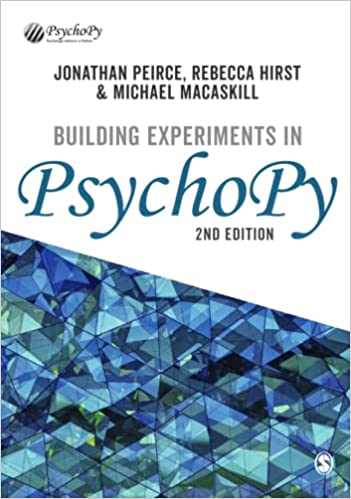Resources (e.g. for teaching)¶
There are a number of further resources to help learn/teach about PsychoPy.
If you also have PsychoPy materials/course then please let us know so that we can link to them from here too!

Workshops¶
We are currently running virtual workshops in several formats, see our workshops pages for details
Youtube tutorials¶
There is our YouTube PsychoPy playlist showing how to build basic experiments in the Builder interface.
Jason Ozubko has added a series of great PsychoPy Builder video tutorials too
Damien Mannion added a similarly great series of PsychoPy programming videos on YouTube
… and a searching YouTube for PsychoPy reveals many more!
Materials for Builder¶
- The most comprehensive guide is the book Building Experiments in PsychoPy by Peirce, Hirst, and MacAskill.
The book is suitable for a wide range of needs and skill sets, with 3 sections for:
The Beginner (suitable for undergraduate teaching)
The Professional (more detail for creating more precise studies)
The Specialist (with info about specialist needs such as studies in fMRI, EEG, …)
At School of Psychology, University of Nottingham, PsychoPy is now used for all first year practical class teaching. The classes that comprise that first year course are provided below. They were created partially with funding from the former Higher Education Academy Psychology Network. Note that the materials here will be updated frequently as they are further developed (e.g. to update screenshots etc) so make sure you have the latest version of them!
There’s a set of tools for teaching psychophysics using PsychoPy and a PsychoPysics poster from VSS. Thanks James Ferwerda
Materials for Coder¶
Please see the page on PsychoPy official workshops for further details on coming to an intensive residential Python workshop in Nottingham.
Marco Bertamimi’s book, Programming Illusions for Everyone is a fun way to learn about stimulus rendering in PsychoPy by learning how to create visual illusions
Programming for Psychology in Python - Vision Science has lessons and screencasts on PsychoPy (by Damien Mannion, UNSW Australia).
Previous events¶
ECEM, August 2013 : Python for eye-tracking workshop with (Sol Simpson, Michael MacAskill and Jon Peirce).

